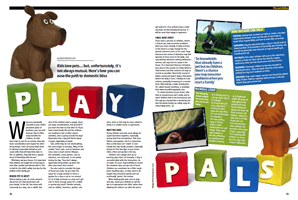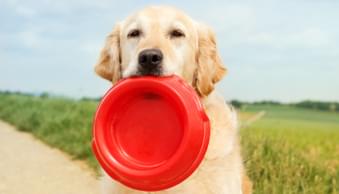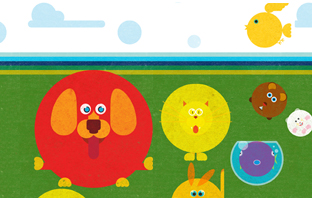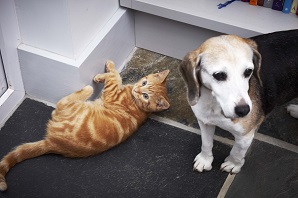Welcome to Petplan’s blog, a space where you can read up on the latest pet-news, find out interesting facts and tips about keeping your pets happy and healthy, and share your views on hot topics.
Refine articles by
clear search- Behaviour problems
- Veterinary problems
- Diet
- TitBits- news and more
- PetPeople magazine archive
- Petplan customer stories
- Travel
- Debates
- Advice
- Petplan feature
- Breed profile
- Health
- Petplan Prize Draw Winner
- Petplan Checklist
- Stories from the surgery
- Petplan Debate
- Charity partnerships
- Awards
- Rehoming
- cat
- dog
- rabbit
- adult
- senior
- puppy
- Lifestyle-sub-category
- Behaviourists-corner
How to prepare your pet for Guy Fawkes Night

Pets and children - how to make it work

Hydration: what every pet owner should know

Is your pet a porker? Here's what to do

Stop your dog mauling the mail

Q: My dog is attacking our mail and the letterbox. What can I do?
A: This is a very common problem with dogs, who are territorial creatures. They become aroused when they hear the postman arriving on ‘their’ territory and rush to the door to see the postman off, often grabbing at the mail and sometimes ripping it to shreds.
The quick and easy solution is to place a secure external postbox outside and as far away from the front door as possible, such as on a front gate, so that the postman does not need to come onto the property and your dog cannot see him. If this is not possible, then protect your letterbox with a wire cage (available from most DIY stores), or consider placing a dog gate across the hallway so that your dog does not have access to the front door area.
Is my rabbit eating too much?

Q: My rabbit is looking a wee bit chubby. I was wondering if this is because we are letting him on the lawn to eat grass?
A: Or could it be that you have been feeding him a little bit too much? You would think that the extra exercise in your garden would make him lose weight, and grass is quite low in energy, so his other supplied foods play the major role in his weight gain.
Commercially prepared foods have far greater energy content, so should be used sparingly when supplementing with hay and grass. Just a very small handful is more than enough each day, allowing him to fill up on grass in your garden to keep his weight down and his teeth well worn and healthy.
Why cats love TV

Q: Since we got a new HD-ready TV, our cat Porsche is fascinated with it, and David Attenborough’s wildlife programmes in particular. Why is that?
A: Like us, cats have binocular vision, but their eyes have adapted to enable them to cope with low-intensity light so that they can hunt at dawn and dusk. While they cannot see colour as well as we humans can, cats are stimulated by movement, and I suspect that Porsche is being stimulated by the moving animals she sees on the wildlife programmes.
There are now DVDs specifically for cats that feature a variety of eye-catching movements from insects, birds and mice, providing good stimulation for indoor cats.
Should you let your cat lick its wounds?

Q: Our cat is a real fighter and keeps coming into the house with bites and scratches. He tends to clean them himself and isn’t keen for us to look at them. My mum says his saliva can kill bacteria, but I don’t believe it. Is this true?
A: No. A cat’s mouth harbours one of the highest concentrations of bacteria in existence, and is far more likely to cause an infection than to treat one. Of course, pets will groom themselves when injured, but you should always try to clean any wound with warm salty water if you can. If the skin is punctured, you will need to see your vet, as abscesses are a common condition in cats that get involved in local dust-ups.
Cat chewing on your houseplants? Here’s what to do

Q: How do I stop my cat eating my houseplants? I did have a spider plant, but she ate most of that and then acted oddly.
A: Great care must be taken with cats around houseplants, as some – lilies, for example – can be very dangerous to them. Most cats will, from time to time, eat a bit of roughage, and should be provided with a tray of cat grass to nibble on. You can buy seed from garden centres or on the internet, and the grass is quick and easy to grow.
The Feline Advisory Bureau (www.fabcats.org) offers advice on plants that are toxic to cats. As your cat has a habit of eating your houseplants, you should check out what plants you have and remove any potential hazards.
Does your cat have an ear infection?

Q: One of my cats, a moggy called Clarence, seems to have a bit of a problem with his ear. I noticed today that one ear is slightly down, and he is reluctant to let me touch it. He is shaking his head on one side as though there is something in it, but he is an indoors-only cat. He is otherwise fine, bright and eating well, so is this something that will clear up on its own?
A: There certainly could be something in your cat’s ear, though infection leading to inflammation and pain could also lead to a feline shaking its head. Cats are generally very hardy creatures and don’t complain much, so if Clarence is clearly distressed, then book him an appointment to see your vet as soon as possible.


